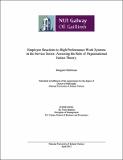| dc.contributor.advisor | Dundon, Tony | |
| dc.contributor.author | Heffernan, Margaret | |
| dc.date.accessioned | 2013-01-15T11:20:03Z | |
| dc.date.available | 2013-01-21T13:14:31Z | |
| dc.date.issued | 2012-05-10 | |
| dc.identifier.uri | http://hdl.handle.net/10379/3148 | |
| dc.description.abstract | This study examines the impact of high performance work systems (HPWS) on employee outcomes. Understanding the HR causal chain linking HR and performance has been an on-going area of investigation. This research seeks to respond to recent calls to integrate a full range of participating actors in HPWS research by examining the association between HR and employee outcomes in particular. It is argued that HPWS should incorporate employee perceptions in order to understand more fully the potential linkages between HPWS and performance. In seeking to develop a more rounded theoretical understanding of the linkages between HPWS and organisational performance, this research utilises organisational justice theory as a means of exploring employee reactions to HPWS.
The present study extends this HPWS literature by (a) focusing on the employee experiences of HPWS, (b) examining how organisational justice theory explains the link between HPWS practices and employee attitudes and behavioural outcomes, and (c) exploring the gap between espoused and enacted HR policies and practices. The empirical research is based on a national HR manager survey (n=169), an employee attitude survey (n = 188) and 23 interviews with HR managers, line managers and employees within three service sector organisations in Ireland. This study links establishment and employee level data using cross level analysis. The findings highlight that (a) distributive, procedural and interactional justice perceptions of HPWS impact employee attitudes and behavioural outcomes; (b) interactional justice has a greater impact on employee outcomes than distributive and procedural justice, thereby emphasising the role of the line manager as a key agent in shaping employee relations outcomes; (c) high investment in HPWS negatively impacts employee job satisfaction and affective commitment and increases perceptions of work pressure; and (d) organisational justice positively mediates the link between HPWS and employee outcomes. The implications of the findings for future research into HPWS are discussed and the limitations of present study are noted. | en_US |
| dc.rights | Attribution-NonCommercial-NoDerivs 3.0 Ireland | |
| dc.rights.uri | https://creativecommons.org/licenses/by-nc-nd/3.0/ie/ | |
| dc.subject | High performance work systems | en_US |
| dc.subject | Performance | en_US |
| dc.subject | Employee reactions | en_US |
| dc.subject | Organisational justice | en_US |
| dc.subject | Management | en_US |
| dc.title | Employee Reactions to High Performance Work Systems in the Service Sector: Assessing the Role of Organisational Justice Theory. | en_US |
| dc.type | Thesis | en_US |
| dc.local.note | This study examined the impact of high performance work systems (HPWS) on employee outcomes. This was achieved by examining employees¿ experiences of high performance work systems through the lens of organisational justice. The research shed new light on the mechanisms through which HPWS impact employee outcomes and served to bridge the gap between macro and micro perspectives of HRM. | en_US |
| dc.local.final | Yes | en_US |
| nui.item.downloads | 9495 | |


